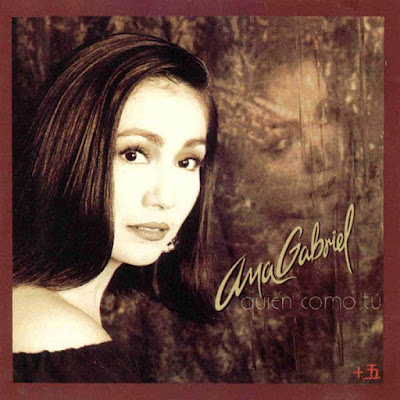Those who have followed the low-level mystery of format release in this travelogue may be intrigued to learn that although this song reached the top of the Hot Latin chart in December 1990 and stayed there through February of 1991, I can find no release of the song dating back earlier than 1992, on a greatest-hits compilation called Personalidad. Whether this is because the Internet in its infinite wisdom has overlooked recording the existence of any Latin single release before about 1994, or because the makers of tracklistings of Rapidshare downloads (which gentlemen and scholars are the only people anywhere who bother giving discographical details on artists that the rest of the Internet is too bougie, white and indie-rock to give a fuck about) got something wrong somewhere, I can't say.
But Ana Gabriel, though one of the more frequent visitors to the top spot here, is also one of the most welcome presences whenever she appears. I've complained passive-aggressively about the domination of 1990 by ballads, and while this is undeniably a ballad — it even starts with those same glistening, watery keyboards that every goddamn song since "Volaré" has started with — it has stronger roots than most of this stuff. You see, it's a ranchera song.
I note from a quick perusal of my tags that I haven't had occasion to talk about ranchera before, so I'll do it now. The easiest shorthand is to call ranchera "Mexican country music," and while it does serve some of the same functions and even grew out of some of the same cultural conditions (the word itself means "from the ranch," i.e. cowboy music), its roots are as much in showbiz as in the fields and hills of Mexican labor. The first ranchera stars were singing actors like Pedro Infante and Jorge Negrete (cf. Gene Autry, Roy Rogers, and the "western" half of country-and-western), and cowboy hats are just as required and just as affected in ranchera as they are in Nashville.
This being the overproduced early 90s, of course, the signifiers of Golden Age ranchera — the moaning horns, the keening accordion, the weeping vocals — aren't present, but the strict timekeeping of the guitar and the melodic form is puro jalisquero. And Ana's singing, pitched halfway between her usual tuff brio and the sob of tradition, would be campy if it didn't also feel so honest. "It's too late" is the English translation of the title, but even if I didn't understand Spanish, that sense of ravishing, inevitable loss hangs over her performance, giving it a shiver of real sorrow that the ballads we've been hearing have all been missing, however well-sung.













